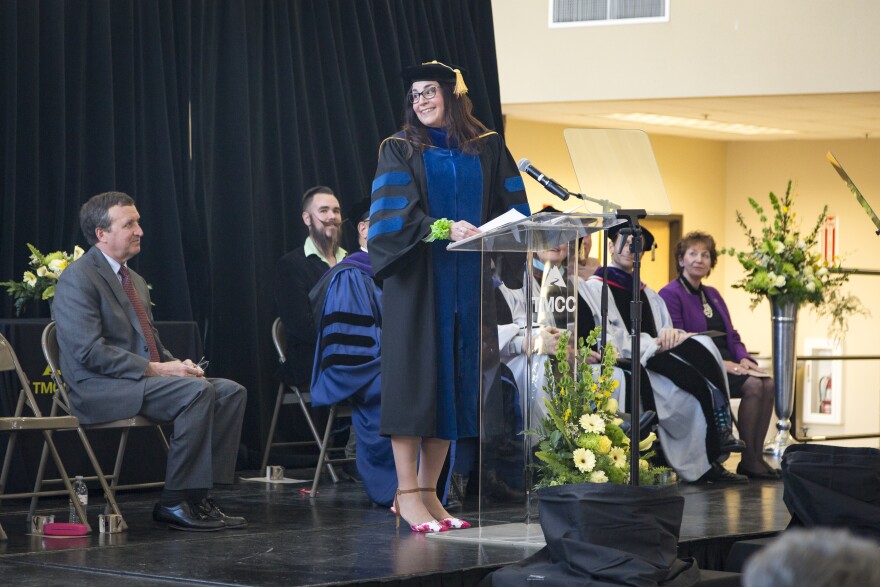Truckee Meadows Community College has now inaugurated its tenth president, Karin Hilgersom. Friday’s ceremony comes as economic leaders across the state look to community colleges for help with bolstering Nevada’s skilled workforce. Our News Director Michelle Billman spoke with Hilgerson to learn more about her priorities for the school over the next few years.
KUNR: Karin, welcome to the program.
Karin Hilgersom (KH): Thank you! I’m delighted to be here.
KUNR: You actually started this job back in the summer. How have you spent these first several months, and what have you learned about TMCC?
KH: I think I’ve spent the first few months being inspired by hundreds of conversations, conversations between faculty, staff, students, community members, supporters of the college and also industry representatives. I’ve been doing listening; I’ve been observing. I’ve also worked with other internal stakeholders at the college to try to craft the next chapter for TMCC.
KUNR: And looking forward to that next chapter, what are some of those key priorities you’re working on?
KH: The first one is one that is not new for faculty, but that is to continue to work on student completion and success. I started my career at community colleges about thirty years ago, but I can tell you that in about the last ten years, we’ve spent a lot of time figuring out why students are completing fast enough or at all, so we will continue to work on that.
And I think one of the things I’m very proud of is that TMCC does have one of the highest graduation rates in the country, coming in at around 30 percent, which isn’t high enough. We need to continue to improve that. Now, if we track a student for six years, that number goes up significantly higher, but it really shouldn’t take six years to complete a two-year certificate or degree.
KUNR: Well, and you mentioned that question of why they’re not completing. What have you found?
KH: Well, there’s all kinds of reasons. Oftentimes, students do get sidetracked because of family issues, because of personal finances, because of good jobs. One of the things in Nevada, [is when] our unemployment rate goes down, we’ve got some really good jobs in the Reno-Sparks area, so some of these students are opting to work. And many of them are working and going to school, but that’s hard to sustain for several years in a row. It’s difficult, and so, we know that those are some of the factors.
On the academic side, probably the greatest factor is, oftentimes, students who are graduating from high schools or they’ve been out of high school for a few years, they need a lot of remedial work around math and writing. And that takes more time.
KUNR: How can that problem be addressed, of getting students where they need to be in those core subject areas?
KH: We really want to work more closely with Washoe County School District, find ways to offer college classes in the high school, which we currently do and we currently do a decent amount, but we need to probably quadruple those numbers or more. I mean, I would like to see no remediation done because all of that is done at high schools with the assistance from community college faculty.
KUNR: I understand that you also hope to improve facilities with some renovations. Tell me about those plans.
KH: We have some beautiful facilities south of town in our health science center and also our newly-renovated applied technologies center, but the Dandini campus needs work. We need to move the theater to the Dandini campus and have a beautiful theater. We also would like to expand our culinary arts program and have a new restaurant and make significant changes there.
The other space that I’m very excited about is our student government leadership, they’ll be going before the board of regents in March, to request a fee increase in order to build a soccer field and a track.
KUNR: Karin Hilgersom, thanks for joining me today.
KH: Thank you. It was my pleasure.
Web extra: Governor Brian Sandoval has set an ambitious goal of having 60 percent of adults in Nevada, between the ages of 25 and 34, attain some form of post-secondary degree or certificate by the year 2025. Hear Hilgersom discuss TMCC’s role in that endeavor:







